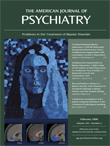Suicide Risk in Placebo-Controlled Trials of Bipolar Disorder
To the Editor:
Jitschak G. Storosum, M.D., Ph.D., and colleagues (1) addressed the important issue of placebo-controlled trials of bipolar disorder and noted that there are ethical problems in using placebo when effective treatments are available, particularly when there is a risk of suicidal behavior. They noted in the abstract that concern about the risk of suicidal behavior “should not be an argument against the conduct of placebo-controlled trials for these indications, provided that appropriate precautions are taken” (p. 799). However, is such a conclusion scientifically credible, logical, or, indeed, ethical when seven of 11 studies examining the treatment of manic episodes and all four studies of the prevention of manic/depressive episodes excluded suicidal patients? Perhaps “appropriate precautions” implies not including those who are suicidal, which—contrary to the assertion in the authors’ conclusion—seems to indicate that there is concern about the risk of suicidal behavior in such placebo-controlled trials.
1. Storosum JG, Wohlfarth T, Gispen-de Wied CC, Linszen DH, Gersons BPR, van Zwieten BJ, van den Brink W: Suicide risk in placebo-controlled trials of treatment for acute manic episode and prevention of manic-depressive episode. Am J Psychiatry 2005; 162:799–802Link, Google Scholar



